- Home
- Sylvia Plath
The Colossus
The Colossus Read online
Sylvia Plath
The Colossus & Other Poems
Sylvia Plath was born in 1932 in Massachusetts. She began publishing poems and stories as a teenager and by the time she entered Smith College had won several poetry prizes. She was a Fulbright Scholar in Cambridge, England, and married British poet Ted Hughes in London in 1956. The young couple moved to the States, where Plath became an instructor at Smith College. Later, they moved back to England, where Plath continued writing poetry and wrote her novel, The Bell Jar, which was first published under the pseudonym Victoria Lucas in England in 1963. On February 11, 1963, Plath committed suicide. Her Collected Poems, published posthumously in 1981, won the Pulitzer Prize.
FIRST VINTAGE INTERNATIONAL EDITION, MAY 1998
Copyright © 1957, 1958, 1959, 1960, 1961, 1962, by Sylvia Plath
All rights reserved under International and Pan-American Copyright Conventions. Published in the United States by Vintage Books, a division of Random House, Inc., New York, and simultaneously in Canada by Random House of Canada Limited, Toronto. Originally published in hardcover in the United States by Alfred A. Knopf, Inc., in 1962.
First published in England in somewhat different form by William Heinemann Ltd.
eISBN: 978-0-307-80882-0
Random House Web address: www.randomhouse.com
v3.1
For Ted
ACKNOWLEDGMENTS
Arts in Society, The Atlantic Monthly, Audience, Chelsea, Critical Quarterly, Encounter, Grecourt Review, Harper’s Magazine, The Horn Book, The Hudson Review, The Kenyon Review, London Magazine, Mademoiselle, The Nation, The Observer, The Partisan Review, Poetry, The Sewanee Review, The Spectator, The Texas Literary Quarterly, and The Times Literary Supplement; also The New Yorker, where the following poems originally appeared: “Hardcastle Crags,” “Man in Black,” “Mussel Hunter at Rock Harbor,” and “Watercolor of Grantchester Meadows.” I would also like to thank Elizabeth Ames and the Trustees at Yaddo, where many of the poems were written.
CONTENTS
Cover
About the Author
Title Page
Copyright
Dedication
Acknowledgments
The Manor Garden
Two Views of a Cadaver Room
Night Shift
Sow
The Eye-mote
Hardcastle Crags
Faun
Departure
The Colossus
Lorelei
Point Shirley
The Bull of Bendylaw
All the Dead Dears
Aftermath
The Thin People
Suicide Off Egg Rock
Mushrooms
I Want, I Want
Watercolor of Grantchester Meadows
The Ghost’s Leavetaking
A Winter Ship
Full Fathom Five
Blue Moles
Strumpet Song
Man in Black
Snakecharmer
The Hermit at Outermost House
The Disquieting Muses
Medallion
The Companionable Ills
Moonrise
Spinster
Frog Autumn
Mussel Hunter at Rock Harbor
The Beekeeper’s Daughter
The Times Are Tidy
The Burnt-out Spa
Sculptor
Flute Notes from a Reedy Pond
The Stones
The Manor Garden
The fountains are dry and the roses over.
Incense of death. Your day approaches.
The pears fatten like little buddhas.
A blue mist is dragging the lake.
You move through the era of fishes,
The smug centuries of the pig—
Head, toe and finger
Come clear of the shadow. History
Nourishes these broken flutings,
These crowns of acanthus,
And the crow settles her garments.
You inherit white heather, a bee’s wing,
Two suicides, the family wolves,
Hours of blankness. Some hard stars
Already yellow the heavens.
The spider on its own string
Crosses the lake. The worms
Quit their usual habitations.
The small birds converge, converge
With their gifts to a difficult borning.
Two Views of a Cadaver Room
1
The day she visited the dissecting room
They had four men laid out, black as burnt turkey,
Already half unstrung. A vinegary fume
Of the death vats clung to them;
The white-smocked boys started working.
The head of his cadaver had caved in,
And she could scarcely make out anything
In that rubble of skull plates and old leather.
A sallow piece of string held it together.
In their jars the snail-nosed babies moon and glow.
He hands her the cut-out heart like a cracked heirloom.
2
In Brueghel’s panorama of smoke and slaughter
Two people only are blind to the carrion army:
He, afloat in the sea of her blue satin
Skirts, sings in the direction
Of her bare shoulder, while she bends,
Fingering a leaflet of music, over him,
Both of them deaf to the fiddle in the hands
Of the death’s-head shadowing their song.
These Flemish lovers flourish; not for long.
Yet desolation, stalled in paint, spares the little country
Foolish, delicate, in the lower right-hand corner.
Night Shift
It was not a heart, beating,
That muted boom, that clangor
Far off, not blood in the ears
Drumming up any fever
To impose on the evening.
The noise came from the outside:
A metal detonating
Native, evidently, to
These stilled suburbs: nobody
Startled at it, though the sound
Shook the ground with its pounding.
It took root at my coming
Till the thudding source, exposed,
Confounded inept guesswork:
Framed in windows of Main Street’s
Silver factory, immense
Hammers hoisted, wheels turning,
Stalled, let fall their vertical
Tonnage of metal and wood;
Stunned the marrow. Men in white
Undershirts circled, tending
Without stop those greased machines,
Tending, without stop, the blunt
Indefatigable fact.
Sow
God knows how our neighbor managed to breed
His great sow:
Whatever his shrewd secret, he kept it hid
In the same way
He kept the sow—impounded from public stare,
Prize ribbon and pig show.
But one dusk our questions commended us to a tour
Through his lantern-lit
Maze of barns to the lintel of the sunk sty door
To gape at it:
This was no rose-and-larkspurred china suckling
With a penny slot
For thrifty children, nor dolt pig ripe for heckling,
About to be
Glorified for prime flesh and golden crackling
In a parsley halo;
Nor even one of the common barnyard sows,
Mire-smirched, blowzy,
Maunching thistle and knotweed on her snout-cruise—
Bloat tun of milk
On the move, hedge
d by a litter of feat-foot ninnies
Shrilling her hulk
To halt for a swig at the pink teats. No. This vast
Brobdingnag bulk
Of a sow lounged belly-bedded on that black compost,
Fat-rutted eyes
Dream-filmed. What a vision of ancient hoghood must
Thus wholly engross
The great grandam!—our marvel blazoned a knight,
Helmed, in cuirass,
Unhorsed and shredded in the grove of combat
By a grisly-bristled
Boar, fabulous enough to straddle that sow’s heat.
But our farmer whistled,
Then, with a jocular fist thwacked the barrel nape,
And the green-copse-castled
Pig hove, letting legend like dried mud drop,
Slowly, grunt
On grunt, up in the flickering light to shape
A monument
Prodigious in gluttonies as that hog whose want
Made lean Lent
Of kitchen slops and, stomaching no constraint,
Proceeded to swill
The seven troughed seas and every earthquaking continent.
The Eye-mote
Blameless as daylight I stood looking
At a field of horses, necks bent, manes blown,
Tails streaming against the green
Backdrop of sycamores. Sun was striking
White chapel pinnacles over the roofs,
Holding the horses, the clouds, the leaves
Steadily rooted though they were all flowing
Away to the left like reeds in a sea
When the splinter flew in and stuck my eye,
Needling it dark. Then I was seeing
A melding of shapes in a hot rain:
Horses warped on the altering green,
Outlandish as double-humped camels or unicorns,
Grazing at the margins of a bad monochrome,
Beasts of oasis, a better time.
Abrading my lid, the small grain burns:
Red cinder around which I myself,
Horses, planets and spires revolve.
Neither tears nor the easing flush
Of eyebaths can unseat the speck:
It sticks, and it has stuck a week.
I wear the present itch for flesh,
Blind to what will be and what was.
I dream that I am Oedipus.
What I want back is what I was
Before the bed, before the knife,
Before the brooch-pin and the salve
Fixed me in this parenthesis;
Horses fluent in the wind,
A place, a time gone out of mind.
Hardcastle Crags
Flintlike, her feet struck
Such a racket of echoes from the steely street,
Tacking in moon-blued crooks from the black
Stone-built town, that she heard the quick air ignite
Its tinder and shake
A firework of echoes from wall
To wall of the dark, dwarfed cottages.
But the echoes died at her back as the walls
Gave way to fields and the incessant seethe of grasses
Riding in the full
Of the moon, manes to the wind,
Tireless, tied, as a moon-bound sea
Moves on its root. Though a mist-wraith wound
Up from the fissured valley and hung shoulder-high
Ahead, it fattened
To no family-featured ghost,
Nor did any word body with a name
The blank mood she walked in. Once past
The dream-peopled village, her eyes entertained no dream,
And the sandman’s dust
Lost luster under her footsoles.
The long wind, paring her person down
To a pinch of flame, blew its burdened whistle
In the whorl of her ear, and like a scooped-out pumpkin crown
Her head cupped the babel.
All the night gave her, in return
For the paltry gift of her bulk and the beat
Of her heart was the humped indifferent iron
Of its hills, and its pastures bordered by black stone set
On black stone. Barns
Guarded broods and litters
Behind shut doors; the dairy herds
Knelt in the meadow mute as boulders;
Sheep drowsed stoneward in their tussocks of wool, and birds,
Twig-sleeping, wore
Granite ruffs, their shadows
The guise of leaves. The whole landscape
Loomed absolute as the antique world was
Once, in its earliest sway of lymph and sap,
Unaltered by eyes,
Enough to snuff the quick
Of her small heat out, but before the weight
Of stones and hills of stones could break
Her down to mere quartz grit in that stony light
She turned back.
Faun
Haunched like a faun, he hooed
From grove of moon-glint and fen-frost
Until all owls in the twigged forest
Flapped black to look and brood
On the call this man made.
No sound but a drunken coot
Lurching home along river bank.
Stars hung water-sunk, so a rank
Of double star-eyes lit
Boughs where those owls sat.
An arena of yellow eyes
Watched the changing shape he cut,
Saw hoof harden from foot, saw sprout
Goat-horns. Marked how god rose
And galloped woodward in that guise.
Departure
The figs on the fig tree in the yard are green;
Green, also, the grapes on the green vine
Shading the brickred porch tiles.
The money’s run out.
How nature, sensing this, compounds her bitters.
Ungifted, ungrieved, our leavetaking.
The sun shines on unripe corn.
Cats play in the stalks.
Retrospect shall not soften such penury—
Sun’s brass, the moon’s steely patinas,
The leaden slag of the world—
But always expose
The scraggy rock spit shielding the town’s blue bay
Against which the brunt of outer sea
Beats, is brutal endlessly.
Gull-fouled, a stone hut
Bares its low lintel to corroding weathers:
Across that jut of ochreous rock
Goats shamble, morose, rank-haired,
To lick the sea-salt.
The Colossus
I shall never get you put together entirely,
Pieced, glued, and properly jointed.
Mule-bray, pig-grunt and bawdy cackles
Proceed from your great lips.
It’s worse than a barnyard.
Perhaps you consider yourself an oracle,
Mouthpiece of the dead, or of some god or other.
Thirty years now I have labored
To dredge the silt from your throat.
I am none the wiser.
Scaling little ladders with gluepots and pails of lysol
I crawl like an ant in mourning
Over the weedy acres of your brow
To mend the immense skull plates and clear
The bald, white tumuli of your eyes.
A blue sky out of the Oresteia
Arches above us. O father, all by yourself
You are pithy and historical as the Roman Forum.
I open my lunch on a hill of black cypress.
Your fluted bones and acanthine hair are littered
In their old anarchy to the horizon-line.
It would take more than a lightning-stroke
To create such a ruin.
Nights, I squat in the cornucopia
Of your left ear, out of the wind,
&nbs
p; Counting the red stars and those of plum-color.
The sun rises under the pillar of your tongue.
My hours are married to shadow.
No longer do I listen for the scrape of a keel
On the blank stones of the landing.
Lorelei
It is no night to drown in:
A full moon, river lapsing
Black beneath bland mirror-sheen,
The blue water-mists dropping
Scrim after scrim like fishnets
Though fishermen are sleeping,
The massive castle turrets
Doubling themselves in a glass
All stillness. Yet these shapes float
Up toward me, troubling the face
Of quiet. From the nadir

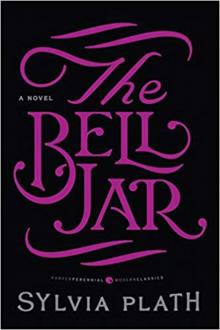 The Bell Jar
The Bell Jar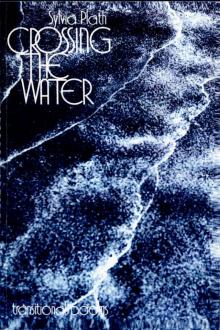 Crossing the Water
Crossing the Water Ariel
Ariel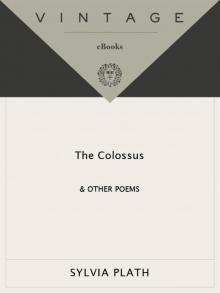 The Colossus
The Colossus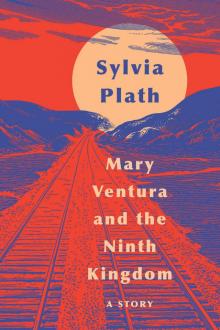 Mary Ventura and the Ninth Kingdom
Mary Ventura and the Ninth Kingdom The Letters of Sylvia Plath Vol 2
The Letters of Sylvia Plath Vol 2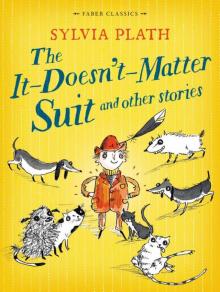 The It Doesn't Matter Suit and Other Stories
The It Doesn't Matter Suit and Other Stories The Letters of Sylvia Plath Volume 1
The Letters of Sylvia Plath Volume 1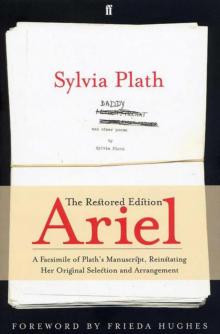 Ariel: The Restored Edition
Ariel: The Restored Edition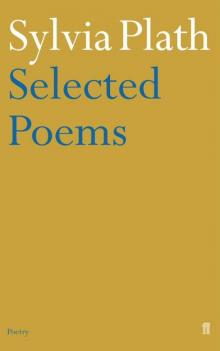 Selected Poems of Sylvia Plath
Selected Poems of Sylvia Plath